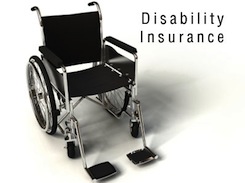Pros and Cons of Disability Insurance for Nannies
December 9, 2012 | in Nannies
 While most states require the employers of domestic workers to carry worker’s compensation insurance to protect employees injured on the job, few states require those employers to take out disability policies. Disability insurance is designed to protect workers that sustain injuries or contract illnesses outside of the workplace that render them incapable of holding steady employment for a specified period of time, which is generally 14 weeks or less.
While most states require the employers of domestic workers to carry worker’s compensation insurance to protect employees injured on the job, few states require those employers to take out disability policies. Disability insurance is designed to protect workers that sustain injuries or contract illnesses outside of the workplace that render them incapable of holding steady employment for a specified period of time, which is generally 14 weeks or less.
Depending on the requirements and guidelines governing disability insurance for domestic workers in your state, there are definite pros and cons alike to carrying a disability insurance policy for your nanny. Assuming that your state is among those that do not require you to obtain disability insurance, there are two sides of the proverbial coin to consider.
Pros of Carrying Disability Insurance for Your Nanny
The relationship between a nanny and her employers can become extremely close, and for some, almost familial. When the woman who cares for your children and oversees your household in your absence is injured or becomes ill, the natural instinct can be to offer your assistance. However, footing the bill of both her salary and that of a temporary replacement nanny over the course of her absence can create a significant financial strain. Preparing for the possibility of a serious injury or severe illness that incapacitates her for several months by paying a relatively small premium for a temporary disability insurance policy is a wise move, especially if she has potentially dangerous or risky hobbies that she engages in during her off hours.
Temporary disability insurance also provides both nannies and their employers with a sense of stability and peace of mind by affording coverage for both unforeseen illness and injury, but may also cover maternity leave. Because the available pool of nannies consists heavily of women working during their childbearing years, this can be an added benefit of securing coverage. Furthermore, a sick or injured nanny who knows that she’ll be provided for is more likely to complete required physical therapy and adhere to recovery guidelines. Concerns of losing her post or financial constraints that might otherwise cause her to rush the process could lead to aggravation of injuries or incomplete recovery; with temporary disability insurance to cover at least a portion of her salary, your nanny is free to concentrate on her full recovery so she is able to return to her post in peak physical condition.
Cons of Carrying Disability Insurance for Your Nanny
The primary drawback of temporary disability insurance is that, even with premiums fully paid and up-to-date, some nannies may not be eligible for benefits in some cases. Benefits generally cannot be received in conjunction with worker’s compensation wage replacement, though there are exemptions to these exclusions in some states and through some carriers. Also, wage continuation payments may be as little as half of a nanny’s regular take-home pay, which may be enough to prevent total financial devastation during her recovery period, but still leave her in less than comfortable conditions.
In many cases, employers that contemplate carrying temporary disability insurance for their childcare provider are also contributing to the premiums for her health insurance and paying the requisite nanny taxes in addition to her salary and any performance bonuses or vacation pay. Though temporary disability insurance premiums may be comparatively small, any additional fees can add up to an infeasible or unmanageable strain on the family budget. Additionally, if you live in a state that allows employers to opt out of state-run programs in favor of a private insurance equivalent, you may find yourself beset by extra fees and higher rates than simply paying into state-funded disability programs. However, these programs are typically quite minimal and have no options for long-term coverage; navigating the complexities of disability insurance in these states can prove to be quite stressful.
Families that are hiring their first nanny are advised to carefully review all pertinent laws before making a final hiring decision in order to avoid surprises in the form of higher-than-expected taxes, fees and unforeseen expenses. Researching the disability insurance requirements of your state and learning what a state-funded program will cover versus a private equivalent is the best way to ensure that both you and your nanny are getting the best possible coverage. Despite the complex nature of nanny compensation and tax laws, parents are not advised to attempt a shortcut by paying off the books; this illegal and risky practice could easily come back to haunt you should she apply for unemployment benefits, disability or Social Security in the future.
← 10 Reptiles That Make Great Pets for Kids | 7 Ways Every Child Can Benefit From Music Lessons →Comments are closed.
DIY & Sign up Online
We have partnered with eNannySource to help you search for the perfect nanny in your area in addition to our other services.
Enter your zipcode to get started:
Nanny Articles
- How to Calm Back to School Jitters
- What to Include in Your Nanny’s Annual Review
- 25 Blogs Featuring the Most Inspiring Parenting Stories
- Crazy Things Kids Say About Old People
- 21 Blogs with Insightful Tips for Helping Kids Through a Move
- Is Lying to Your Kids About the Tooth Fairy Wrong?
- 21 Blogs Making Fun Homemade Mixtures for the Kids to Get Their Hands Into
- 10 of the Most Hated Cartoon Characters by Moms of All Time
- How to Hide Electrical Wires from Computers, TVs and Small Appliances
- 30 Blogs with the Best Tips on Helping Your Child Prepare for Standardized Testing
National Nannies History
- Pillow Agreement Definition
- Retroactive Caregiver Agreement
- What Is Condition and Warranty in Contract Law
- Shared Ownership Contract Template
- How to Start Labour Contract Business
- Prenuptial Agreement in Bengali
- State of Nj Installment Agreement
- When Does an Agreement Become Unconditional
- Illinois Contract Law Impossibility of Performance
- Service Agreement Francais
- Group Contains a Subject and a Verb in Agreement
- Tenant Commercial Lease Agreement
- Indigo Card Agreement
- Home Improvement Contractors License Louisiana
- The Contracts Rights of Third Parties Act 1999 Shall Not Apply to This Agreement
- Taliban Agreement Text
- 6 Months or 12 Months Tenancy Agreement
- Property Management Agreements Should Include the following except
- Agent Contracting with Humana
- Nrcan Collective Agreement


